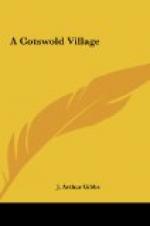day in a slow procession through gates, “craning”
at the smallest obstacles, or dismounting and “leading
over.” No; hard riding is the best antidote
in the world for the luxurious tendency of these days.
A hundred years ago, when the sport of fox-hunting
was in its infancy and modern conditions of pace were
unknown, there was less need for this kind of recreation,
“the image of war without its guilt, and only
twenty-five per cent of its danger.” For
there was real fighting enough to be done in olden
times; and amongst hunting folk, though there was
much drinking, there was little luxury. Therefore
our fox-hunting ancestors were content to enjoy slow
hunting runs, and small blame to them! But those
who are fond of lamenting the modern spirit of the
age, which prefers the forty minutes’ burst over
a severe country to a three hours’ hunting run,
are apt to lose sight of the fact that in these piping
times of peace, without the risks of sport mankind
is liable to degenerate towards effeminacy. For
this reason in the following poem I have purposely
taken up the cudgels for that somewhat unpopular class
of sportsmen, the “thrusters” of the hunting
field. They are unpopular with masters of hounds
because they ride too close to the pack; but as a
general rule they are the only people who ever see
a really fast run. In Shakespeare’s time
hounds that went too fast for the rest of the pack
were “trashed for over-topping,” that is
to say, they were handicapped by a strap attached
to their necks. In the same way in every hunt
nowadays there are half a dozen individuals who have
reduced riding to hounds to such an art that no pack
can get away from them in a moderately easy country.
These “bruisers” of the hunting field ought
to be made to carry three stone dead weight; they
should be “trashed for overtopping.”
However, as Brooksby has tersely put it, “Some
men hunt to ride and some ride to hunt; others, thank
Heaven! double their fun by doing both.”
There are many, many fine riders in England who will
not be denied in crossing a stiff country, and who
at the same time are interested in the hounds and
in the poetry of sport: men to whom the mysteries
of scent and of woodcraft, as well as the breeding
and management of hounds, are something more than
a mere name: men who in after days recall with
pleasure “how in glancing over the pack they
have been gratified by the shining coat, the sparkling
eye—sure symptoms of fitness for the fight;—how
when thrown in to covert every hound has been hidden;
how every sprig of gorse has bristled with motion;
how when viewed away by the sharp-eyed whipper-in,
the fox stole under the hedge; how the huntsman clapped
round, and with a few toots of his horn brought them
out in a body; how, without tying on the line, they
‘flew to head’; how, when they got hold
of it, they drove it, and with their heads up felt
the scent on both sides of the fence; how with hardly
a whimper they turned with him, till at the end of
fifty minutes they threw up; how the patient huntsman
stood still; how they made their own cast: and
how when they came back on his line, their tongues
doubled and they marked him for their own.”
To such good men and true I dedicate the following
lines:—




